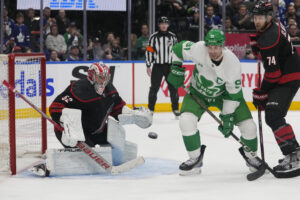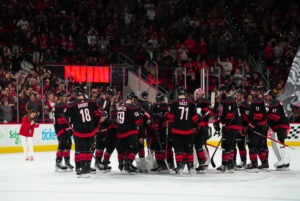The Phoenix Roadrunners history is rich, with the team becoming Arizona’s first professional sports team back in 1967. They played professional ice hockey at the Arizona Veterans Memorial Coliseum in Phoenix. The Roadrunners played in the WHL (Western Hockey League) from 1967-74 and were champions in both 1973 and 1974. The WHL disbanded in 1974, but the Roadrunners became a part of the WHA, (World Hockey Association) from 1974-77 and subsequently went to the Pacific Hockey League. The PHL ended operations in 1979.
Ten years later, in 1989, the Roadrunners were back as part of the International Hockey League. That run in the IHL lasted from 1989-97. They became the “farm team” for the Los Angeles Kings in 1990. When the Phoenix Coyotes came to town from Winnipeg in 1996, the Roadrunners were unable to compete with the NHL franchise. The Phoenix Roadrunners, once again, left town.
In 1998 the Phoenix Coyotes moved to Gila River Arena in Glendale, AZ. Then, in 2005, the same people that own the Phoenix Suns, Arizona Rattlers and Phoenix Mercury, announced they had purchased an ECHL hockey franchise. They also obtained the rights to the name, so that Phoenix could have their Roadrunners once again. The Roadrunners played at the Talking Stick Resort Arena (formerly known as US Airways Center and America West Arena) in downtown Phoenix. They changed the name of the hockey club to the Arizona Coyotes in 2014.
Phoenix Roadrunners History Defines Hockey Nostalgia
WHL Days
Minor league hockey has its attributes which attracts fans. It was good family entertainment and it was reasonable to go to a game. During the WHL days, the Phoenix Roadrunners were a successful team with some skilled players.
- Jim Murray (D) 364 games, 33 goals, 168 assists for 211 points
- Larry Lund (C) 203 games, 92 goals, 169 assists for 261 points
- Andre Hinse (LW) 277 games, 143 goals, 170 assists for 313 points
- Wayne Hicks (RW) 275 games, 90 goals, 128 assists for 218 points
- Howie Young (D/RW) 158 games, 68 goals, 102 assists for 170 points
- Bob Barlow (RW) 207 games, 80 goals, 119 assists, for 199 points
They went on to win two championships under the direction of famed head coach Sandy Hucul who also coached the team when they migrated to the WHA and finally in the Pacific Hockey League.
WHA Days
Hucul stayed on as the bench coach for the WHA Phoenix Roadrunners when they played in that league from 1974-77. During the 1974-75 season Hucul led the team to the playoffs as they were eliminated in the first round with 86 points and a 39-31-8 record. He duplicated the same result in the following season gathering 84 points with a 39-35-6 record. The games attracted an average of nearly 7,000 fans a game.
Super Flea Robbie Ftorek
The WHA was attempting to compete with the NHL and one of the star players for the Roadrunners in the league was Robbie Ftorek. He was a prolific scorer even with his diminutive size of 5′-10″, 155 pounds. He was known as the “Super Flea” since he tormented and pestered opposing players and was an adept forechecker. His style of play led to 118 goals and 180 assists good for 298 points in 213 games with the Roadrunners in the WHA. That is a scoring clip of 1.40 points per game. He was a fiesty player too gathering 365 penalty minutes in his total 373 WHA games.
Ftorek went on to a lengthy coaching career including ten seasons in the AHL as a head coach and one season as an assistant coach. He also did seven years as a head coach for the Los Angeles Kings (2), Quebec Nordiques (now Colorado Avalanche) (1), New Jersey Devils (2), Boston Bruins (2). Additionally he served as a head coach for six years in the OHL, and three more seasons most recently in the ECHL as a head coach. In 2019 he was selected to the AHL Hall of Fame.
PHL Days
Right wing Frankie Hughes played in 40 PHL games for the Roadrunners gathering 33 goals and 41 assists for 74 points. Jim Montgomery, a centre for the team had 27 goals and 37 assists for 64 points. Jim Boyd another centre, had 20 goals and 61 assists in 60 games and played for the Roadrunners WHA and WHL teams as well. The best memories of the PHL was the endless fights which extended a normal 2:30 game in to 3-4 hour affair. It was not abnormal for fights to break out even involving the two goalies. It defined the saying “I went to a fight and a hockey game broke out.”
IHL Days
Two star players for the IHL version of the Phoenix Roadrunners were Sylvain Couturier and Marc Fortier. Couturier may sound like a familiar name and it should be since Sylvain’s son is a star player for the Philadelphia Flyers. Sylvain was a good scorer for the Roadrunners gathering 92 goals and 73 assists for 165 points in 143 games. While Sean Couturier has done very well in the NHL with 156 goals and 246 assists in 647 NHL games over nine seasons.
Mark Fortier collected 43 goals and 70 assists in 98 games over two seasons in the IHL. Brian Chapman was the Roadrunners enforcer and sat in the penalty box for 757 minutes over his four seasons.
Phoenix Roadrunners History Epilogue
Let’s face it, without the Roadrunners NHL hockey may not have landed in the desert. Many local fans of the game are glad it did. Hockey in the desert has progressed considerably over the years and youth hockey is especially thriving.
Here’s a video which puts it all in perspective.
Main Photo:






